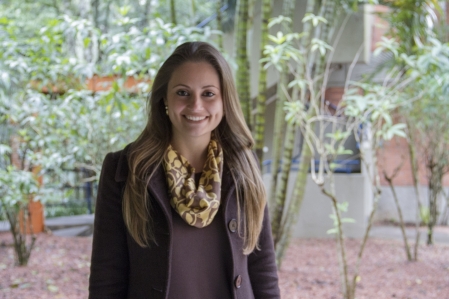PhD research published on international journal
Professors and postgraduate students help making research at Univates publically known, not only by presenting work at international events, but also by publishing their papers in international journals. Environment and Development student Joseline Manfori’s paper “Extending the database of Permian palaeo-wildfire on Gondwana: charcoal remains from the Rio do Rasto Formation (Paraná Basin), Middle Permian, Rio Grande do Sul State, Brazil” has recently been published in science magazine Palaeogeography, Palaeoclimatology, Paleoecology. The article shows some of the findings obtained by Joseline in her thesis. The paper discusses the Permian palaeo-wildfire on Gondwana, from 272 million to 259 million years ago. During these years, namely in all Western Gondwana (South Africa, South America and Antarctica) no similar event had been noticed, which indicates the scientific relevance of Joseline’s study.
According to Joseline, palaeo-wildfire had only occurred long before, as in the Permian (298 million to 272 million years ago). “This work is part of my PhD thesis which aims to identify a palaeoclimatic signature for the Permian in Western Gondwana, based on palaeobotanical data”- she says. In addition, Joseline says she will carry on her research in Germany, as she wants to apply for a split-site Phd Capes (Brazilian Federal Agency for Support and Evaluation of Graduate Education) scholarship in the first half of 2006.
Course coordinator André Jasper says we are living one of the most important moments for the international palaeontology (palaeobotany). Joseline’s research is extremely important to us, particularly because it is part of her PhD studies and it has received Capes highest qualification (A1) in Environmental Sciences, which is an indication of the quality of the studies our teachers have been conducting. Jasper says her research has the support of national funding bodies (Fundação de Amparo à Pesquisa do Estado do Rio Grande do Sul, Conselho Nacional de Desenvolvimento Científico e Tecnológico and Capes) international funding bodies and also benefits from partnerships between research institutes and Brazilian and foreign researchers.
Palaeogeography, Palaeoclimatology, Paleoecology (Paleogeografia, Paleoclimatologia e Paleoecologia) is a high-quality comprehensive multidisciplinary study on Palaeoenvironment, including Palaeoclimatology. The purpose of the study is to collect palaeoenvironment data with global implications to raise questions of general interest.
Capes Qualification
Qualis is the standard procedures used by Capes to qualify postgraduate papers. These procedures are updated every year and journals are classified according to the areas of study. The overall qualification scores are A1 (the highest); A2; B1; B2; B3; B4; B5; and C (the lowest - 0).
By: Nicole Morás
July 16th, 2015.
